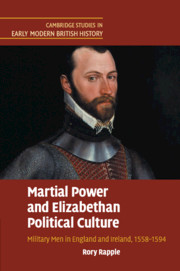Book contents
- Frontmatter
- Contents
- Acknowledgements
- List of abbreviations
- Notes on the text
- Political map of sixteenth-century Ireland circa 1534
- CAMBRIDGE STUDIES IN EARLY MODERN BRITISH HISTORY
- Introduction
- 1 Chimneys in summer
- 2 Martial men and their discontents
- 3 The limits of allegiance: English martial men, Europe and the Elizabethan regime
- 4 The captains and the Irish context
- 5 The limits of imperium: martial men and government
- 6 The limits of rhetoric: the captains and violence in Elizabethan Ireland to 1588
- 7 Unlimited indemnity: delegates versus viceroys
- Conclusion
- Bibliography
- Index
4 - The captains and the Irish context
Published online by Cambridge University Press: 02 July 2009
- Frontmatter
- Contents
- Acknowledgements
- List of abbreviations
- Notes on the text
- Political map of sixteenth-century Ireland circa 1534
- CAMBRIDGE STUDIES IN EARLY MODERN BRITISH HISTORY
- Introduction
- 1 Chimneys in summer
- 2 Martial men and their discontents
- 3 The limits of allegiance: English martial men, Europe and the Elizabethan regime
- 4 The captains and the Irish context
- 5 The limits of imperium: martial men and government
- 6 The limits of rhetoric: the captains and violence in Elizabethan Ireland to 1588
- 7 Unlimited indemnity: delegates versus viceroys
- Conclusion
- Bibliography
- Index
Summary
When considering English government in Ireland during the Elizabethan period, the metaphor of ‘the state as a work of art’ seems the least appropriate one to use. From the crown's perspective, Ireland resembled a hopelessly cluttered desk covered with remnants of pieces of work started once upon a time but subsequently abandoned, sometimes abruptly, sometimes gradually. While England had achieved a strong framework of government complete with regnal solidarity, a wealthy nobility and a confident juridical identity, Ireland seemed a place of confusion, a place where generalisations were irritatingly useless, a place where micro-diplomacy mattered more than grand design.
THE FAILED CONQUEST
The English crown's constitutional claim over Ireland, based on the papal bull Laudabiliter of 1155, had begun in earnest from the moment Henry II of England had taken up his lordship of Ireland in 1171 coming in on the harvest of the original English conquistadores, Strongbow, Robert Fitzstephens and Hervey de Montmorency. Many of the Irish kings preferred to submit to him in the hope of outmanoeuvring the first invaders. Subsequently, the English influence in the country spread far and wide, disrupting the Irish septs, turning many of them out of their territories, engulfing them using technologically superior military might.
- Type
- Chapter
- Information
- Martial Power and Elizabethan Political CultureMilitary Men in England and Ireland, 1558–1594, pp. 127 - 161Publisher: Cambridge University PressPrint publication year: 2009

